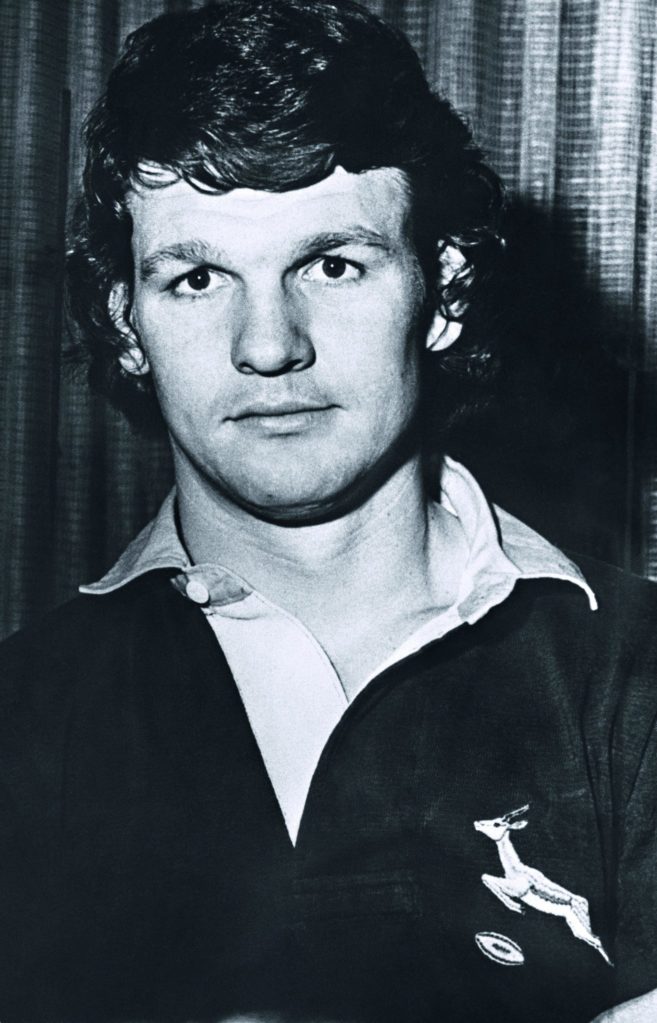Money, money everywhere—what a contrast to the first time an African nation won the trophy 16 years ago in the twilight of the amateur game.

February 1980. South African rugby legend and Springbok rugby captain Morne du Plessis.
On 24 June 1995, a collection of South African schoolteachers, estate agents and business professionals achieved something very rare; they won the Rugby World Cup on home soil at the first time of asking. What a different game it was just over 16 years ago. At the time, toplevel rugby in the world was run as an amateur sport with players being paid under the table through so-called ‘shamateurism’. On the field, the forwards were a heavy-footed collection of giants and portly gentlemen, who pummeled each other in the scrums and loose, while the backs were a group of lithe speedsters who claimed all the glory. Modestly built men such as Wilf Rosenberg and Hugh Bladen were masters of the sidestep and looked it up the middle’, in the manner of England’s Mike Tindall, France’s
Mathieu Bastareaud or the imposing All Black No 12—Ma’a Nonu. That golden tournament in 1995 will be remembered for Mandela in a Springbok jersey, a last-gasp winning kick from Joel Stransky and a juggernaut of a man called Jonah Lomu.
Here was a 20-year-old man from New Zealand. He was 1.96 meters and around 120 kilograms and yet played on the wing, where he struck fear into the hearts of those who dared get in his way. One Springbok said the mere sight of Lomu striding from the team bus listening to music through oversized headphones put the fear of God into him. Lomu arguably won the semi-final for the All Blacks by shellacking England, in the process bulldozing their tough fullback, Mike Catt, to score four tries in a 45-29 victory. The sport had rarely seen such an athlete and Lomu’s explosive impact pushed the game towards professionalism within a year.
Loading...
Cut to 2011: the Springboks are in New Zealand to defend the Webb Ellis trophy and a small player in the backline is a rarity. There are now more like four or five ‘Jonahs’ on a team. Players spend five days a week, eight hours a day, working at their game. Highly paid fitness experts, sports psychologists and doctors all play a huge part in preparing players for peak performance and for this there is one requirement—money. Compared to 1995, the present day South African Rugby Union (SARU) is awash with money. According to its financial report for 2010, SARU had R102 million ($14.6 million) in cash reserves, with R82 million ($11.7 million) of these cash reserves attributable to deferred broadcasting and sponsorship revenue.
Television has put many times more money into the coffers of rugby and its players than gate receipts ever could. On top of that, the South African team has three hefty sponsors: Absa, Canterbury and BMW are all pouring millions into the game. Former Springbok captain Morne
Du Plessis, who played from 1971 to 1980 and was also the manager of thevictorious ’95 South African team, believes that although players these days are well paid, the salaries are nowhere near those of professional footballers. “It’s a different game now. It’s a profession. It’s from 08h00 to 17h00— even more. We were amateurs, we practised twice a week,” says Du Plessis. “If you look at footage from my day, it looks like a different sport now. The skills today and the strength is something to behold, the guys today are just so powerful. Professionalism and money in the sport has made it a better sport.”

24 Jun 1995: South African rugby captain Francois Pienaar receives the William Webb Wellis Trophy from President Nelson Mandela after they defeated New Zealand to win the Rugby World Cup Final at Ellis Park, Johannesburg, South Africa. Mandatory Credit: Dave Rogers /Allsport
Looking to the World Cup, Du Plessis, who led the Springboks, is optimistic about the defending champions’ chances. “Don’t take anything that happened in the Tri-Nations as a marker for the World Cup. There are probably three important matches at the World Cup—the quarter final, the semi-final and the final. To be ready on those days will be key. I think we will go in as underdogs but I believe it’s the best position we play from. “I think we can do it. We’ll be up against the Australians and the All Blacks, the Irish team is to be reckoned with and England is also a good team. There are no real favorites,” adds Du Plessis. The final will be on October 23. For South Africa it is the chance of retaining the trophy and winning it for a third time in the land that bore the mighty Jonah Lomu. Win or lose, the Springboks will return home with bigger bank balances than the heroes of ’95 could ever dream of.

New Zealand winger Jonah Lomu is tackled by South African scrumhalf Joost Van der Westhuizen during the Rugby World Cup final played against New Zealand June 24. On left is South African centre Hennie le Roux, on right No 8 Mark Andrews
Loading...
